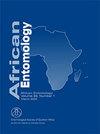Risk Analysis of Brevipalpus Species (Acari: Tenuipalpidae) Introduction via Kiwifruit (Actinidia spp.) Imported to South Africa
IF 1.2
4区 农林科学
Q3 ENTOMOLOGY
引用次数: 0
Abstract
International agricultural trade is a pathway by which pests and diseases can be transported and introduced to new areas. We examined South Africa's import of kiwifruit (Actinidia spp.) as a pathway for the introduction of mites in the genus Brevipalpus (Acari: Tenuipalpidae). Kiwifruit is imported as fresh fruit and propagation material from various countries. This study aimed to analyse the risk posed by these mites associated with the importation of kiwifruit over a period of 11 years (2009–2019). The majority of mite interceptions were associated with fresh fruit (97 %) mainly from Italy. Five mite species were recorded: Brevipalpus obovatus, B. chilensis, B. hondurani, B. lewisi and a new, undescribed species in genus Brevipalpus. The majority of specimens intercepted belonged to the new species. Any species not present in South Africa, particularly this Brevipalpus sp. nov., may pose a potential threat to South Africa's agricultural and horticultural industries and environment as well as biodiversity. The introduction of these species is a major phytosanitary concern because these polyphagous Brevipalpus spp. could find favourable conditions for their survival, development, reproduction and dispersal since South Africa is a country of diverse environmental conditions and various host plants.南非进口猕猴桃引种短吻龙的风险分析
国际农业贸易是病虫害运输和引入新地区的途径。我们调查了南非进口的猕猴桃(猕猴桃属),这是引入短吻螨属(Acari:Tenuipalpidae)的一种途径。猕猴桃是从各国进口的新鲜水果和繁殖材料。这项研究旨在分析这些螨虫在11年(2009-2019年)内与进口猕猴桃相关的风险。大多数螨类截获与新鲜水果有关(97%),主要来自意大利。记录了五种螨类:obovatus Brevipalpus、chilensis B.hondurani B.lewisi和Brevipaltus属中一个新的、未描述的物种。截获的大部分标本属于新物种。任何不存在于南非的物种,特别是这种新的Brevipalpus sp.nov.,都可能对南非的农业和园艺产业、环境以及生物多样性构成潜在威胁。引入这些物种是一个主要的植物检疫问题,因为南非是一个环境条件多样、寄主植物多样的国家,这些多食性的短吻龙可以为它们的生存、发育、繁殖和传播找到有利的条件。
本文章由计算机程序翻译,如有差异,请以英文原文为准。
求助全文
约1分钟内获得全文
求助全文
来源期刊

African Entomology
生物-昆虫学
CiteScore
2.00
自引率
0.00%
发文量
17
审稿时长
6-12 weeks
期刊介绍:
African Entomology (ISSN 1021-3589 – print / 2224-8854 – online) replaced the old Journal of the Entomological Society of Southern Africa in 1993. A single volume consisting of two issues (March and September) is published annually. The journal is indexed in all major abstracting journals
African Entomology is a peer reviewed scientific journal that publishes original research articles and short communications on all aspects of entomology, with an emphasis on the advancement of entomology on the African continent.
 求助内容:
求助内容: 应助结果提醒方式:
应助结果提醒方式:


